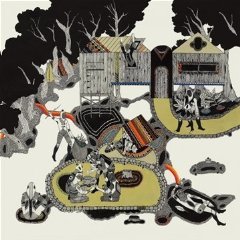In February 2009, Vetiver released their album, Tight Knit, a homely collection of soft songwriting that went against the grain of the more dark and introspective experimentation of previous outing To Find Me Gone. Another band who found themselves amid the flurry of freak-folk’s awakening earlier this decade, Animal Collective, released in Merriweather Post Pavilion a record that focused on the domestic, family-oriented travails of the band’s members, while the songs themselves were more conventional and pop than ever before. Devendra Banhart, in his hiatus in the last two years, seems to have arrived at a smooth kind of bluesy soul, as unsubtle as Cripple Crow was colourful.
The suggested pattern is this: everyone is going back to basics, going home to roost in less challenging sonic realms, and changing their lyrical priorities. To put it most bluntly: these bands are losing their edge. The freak is being lost from their folk. Espers’ fourth album does not buck this trend.
Their previous record, II (2006), is an album for the annals. So imaginative and intense was it that Espers transcended the boundaries of the post-modern folk world they found themselves in, and discovered a higher plane that mixed The Wicker Man soundtrack, early Black Sabbath and Pentangle. II explored mysterious corners of what was possible with this evolving folk canon in droney curiosities such as ‘Widow’s Weed’, earning them comparisons with Krautrock and minimalism.
Generally, III eschews all that for a return to the music that Greg Weeks and Meg Baird listened to in their youth, and therefore touchstones are Denny-era Fairport Convention and perhaps Steeleye Span. These are meticulously well-honed songs, relatively unthreatening in their tone and unchallenging in their arrangements. The other major difference is that III, without being exactly celebratory, is a more chipper than Espers really should be.
Compare, for example, first track on III, ‘I Can’t See Clear’, with opener on II, ‘Dead Queen’. The latter is one of Espers’ best songs and in its slow, misty ascent encapsulates the attractive pagan mood of that album. ‘I Can’t See Clear’ is an upbeat, major-key, rather Romantic exercise in which Baird takes her impression of Jacqui McShee to new, unprecedented levels (she does so again on ‘Another Moon Song’, practically a Pentangle cover). It’s actually very lovely, but by Espers’ own standards is a little one-dimensional.
‘The Road of Golden Dust’ offers a slight return to old ways, mainly driven by the quite beautiful guitar of Brooke Sietinsons. In fact if III does offer a genuine evolution to their sound, it is found in the shimmer and groan of her playing, often transforming the bare bones of the Weeks-Baird songwriting axis into deeper, more affecting places.
‘Caroline’, featuring both Espers lynchpins on vocals, is III’s best track. If their aim was to return to simpler and more accessible forms, here they have perfected it. Not so traditional as to risk quaintness, here is a pop song that evokes the same pastoral sweetness as Vashti Bunyan’s more bearable offerings. It isn’t until ‘That Which Darkly Thrives’ that nods to old, moody Espers emerge. And still, this is a song that is easily hummable.
III eventually reaches more leftfield territories on the album’s feverish crescendo, ‘Colony’, with vocals almost chant-like in their menace. It is this sort of intensity that elevates Espers above the Banharts and Newsoms of this world, with their oft-gimmicky takes on mystical tropes. Espers are serious about this stuff, and want you to be scared. Indeed, the comparative softness of the rest of the album ensures ‘Colony’, a true triumph, is all the more engrossing.
If the impression has been given that III suffers from its mellowness, then that’s unfortunate. The truth is that while fans of what made Espers so fascinating in the first place might find that band absent on this record, III proves that Weeks and Baird are capable of a lot more than just atmosphere. Sometimes a good tune is all you need.


